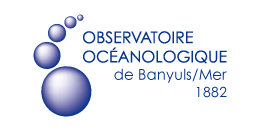Simulated terrestrial runoff shifts the metabolic balance of a coastal Mediterranean plankton community towards heterotrophy
Résumé
Climate change is projected to increase the frequency and intensity of extreme rainfall events in the Mediterranean region, increasing runoffs of terrestrial matter into coastal waters. To evaluate the consequences of terrestrial runoff for plankton key processes, an in situ mesocosm experiment was conducted for 18 d in the spring of 2021 in the coastal Mediterranean Thau Lagoon. Terrestrial runoff was simulated in replicate mesocosms by adding soil from an adjacent oak forest that had matured in water from the main tributary river of the lagoon. Automated high-frequency monitoring of dissolved oxygen, chlorophyll a fluorescence, salinity, light, and temperature was combined with manual sampling of organic and inorganic nutrient pools, pH, carbonate chemistry, and maximum quantum yield (Fv:Fm) of photosystem II (PSII). High-frequency data were used to estimate the gross primary production (GPP) of oxygen, community respiration (CR), and phytoplankton growth (μ) and loss (L) rates. During the first half of the experiment (d2–d11), the simulated runoff reduced light availability (−52 %), chlorophyll a concentrations (−70 %), and phytoplankton growth rates (−53 %). However, phytoplankton maintained a certain level of primary production by increasing its photosynthetic efficiency. Meanwhile, the runoff enhanced CR (+53 %), shifting the metabolic status (GPP : CR) of the system toward heterotrophy and increasing the partial pressure of carbon dioxide (pCO2), potentially switching the direction of the air–sea CO2 exchange. However, during the second part of the experiment (d11–d17), remineralized nutrients boosted phytoplankton growth (+299 %) in the terrestrial runoff treatment but not its loss rates, leading to phytoplankton biomass accumulation and suggesting a mismatch between phytoplankton and its predators. Our study showed that a simulated terrestrial runoff significantly affected key plankton processes, suggesting that climate-change-related increases in runoff frequency and intensity can shift the metabolic balance of Mediterranean coastal lagoons towards heterotrophy.
| Origine | Fichiers éditeurs autorisés sur une archive ouverte |
|---|---|
| licence |



